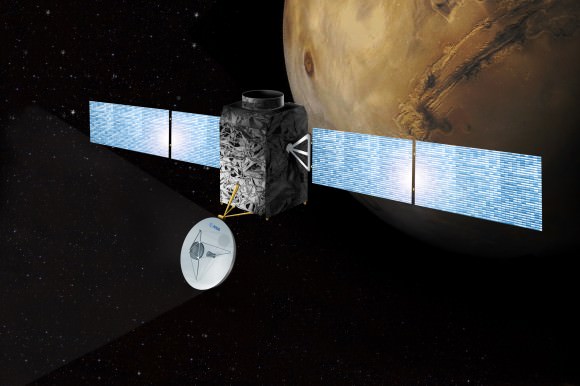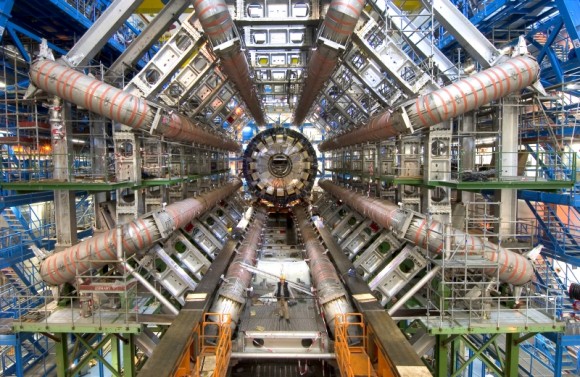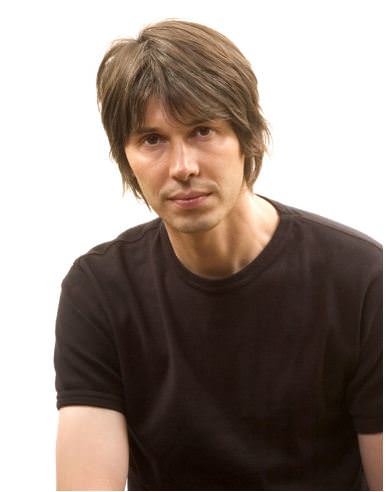[/caption]
Professor Brian Cox is the Chair in Particle Physics at the University of Manchester, and works on the ATLAS experiment (A Toroidal LHC ApparatuS) at the Large Hadron Collider at CERN. But he’s also active in the popularization of science, specifically with his new television series and companion book, Wonders of the Universe. Universe Today had the chance to talk with Cox, and yesterday he told us about the recent advances in particle physics. Today we ask him about his favorite space missions and his hopes for the future of science.
For a chance to win a copy of the “Wonders of the Universe” book, see our contest post.
Universe Today: The Juno mission just launched to Jupiter and there are lots of other space missions going on. What are some your favorites and your hopes of what those kinds of missions will discover?
Brian Cox: The enormous question for space exploration is origin of life on other worlds. That is currently THE big question. We’ve seen discoveries recently about possible, plausible evidence of flowing water on Mars. There’s been evidence for awhile that there is perhaps subsurface water, but seeing what looks to be the signature of flowing, briny water — today — is very suggestive. On Earth, where we have water we have life, so this new finding makes Mars even more fascinating. The ExoMars project, the joint European-American mission to Mars to look for life is going to be one of most exciting missions yet, because there’s a good chance of finding it.

Now we’re heading off to Jupiter, and Europa is actually a fascinating place for the same reason. There is a huge amount subsurface water on Europa, and there has been speculation that colored markings on the surface of Europa could be life. It looks as though there may be seasonal shifts, and that could be possible cyanobacteria in the ice. This is really speculative, but this is the kind of language people are using now, talking about finding life with real optimism.
Beyond the solar system, the search for exoplanets is going very, very well. Virtually every star we survey we find planets! Well, that might be a bit of an exaggeration, but we’ve found hundreds and hundreds of planets. We’ve begun to see Earth-like planets and so the next step is to do spectroscopy to look at light passing through the atmospheres of those planets and look for signatures of elements like oxygen. Again, if you find oxygen-rich atmospheres — which we are on the verge of looking for now — if you find that, then you’ve got pretty good evidence there is life on those planets.
So, it could be we find life on a distant planet before we find life in the solar system, which would be tremendous. But really, I do think the big discoveries will be all about life, certainly in solar system exploration.
UT : What are your hopes for the future regarding physics, technology and space?

COX: I’d like to see an increase in rational thinking, which is synonymous with
scientific thinking.
Scientifically, the Large Hadron Collider is going to make a huge difference. It really is going to revolutionize our fundamental understanding of the way the universe works. Then there are these huge questions in fundamental physics, the question of why gravity is so weak, why the universe began in such an ordered way.
Then, what is 96% of the Universe made of? We know our Universe is full of something called Dark Matter and we don’t know what it is. The Universe is accelerating in its expansion, which we call Dark Energy and we don’t know what that is either. There is something fundamental going on.
I’d like to think this period of time is like the period of 1890 onwards to the turn of the 20th century. There were some small problems with things like understanding the spectrum of light, what atoms were; little problems really. But when we finally understood, it revolutionized our understanding of the Universe. Shortly after the turn of the century we got quantum theory, relativity – a complete change in our understanding. I’d like to think that maybe it’s a bit like that at the moment. There are so many little — and big — chinks in the armor of our picture of the Universe at the fundamental level. I think within the next few years, there will be big shifts, and probably, they will be led by the data from the LHC.
Tomorrow: Wonders
Find out more about Brian Cox at his website, Apollo’s Children


The dark energy problem is a question of understanding the vacuum state of the universe. I strongly think that our ideas about the vacuum in quantum field theory are beginning to show some flaws. In effect we have filled it with many degrees of freedom, which probably do not actually exist.
LC
Is the prof starring in his own 2012 calendar? If it had a photo of him on every page I would definitely be buying one if he is…
I’m really enjoying this interview, thanks for bringing it to us.
brian cox is my favorite member of oasis
LOL!